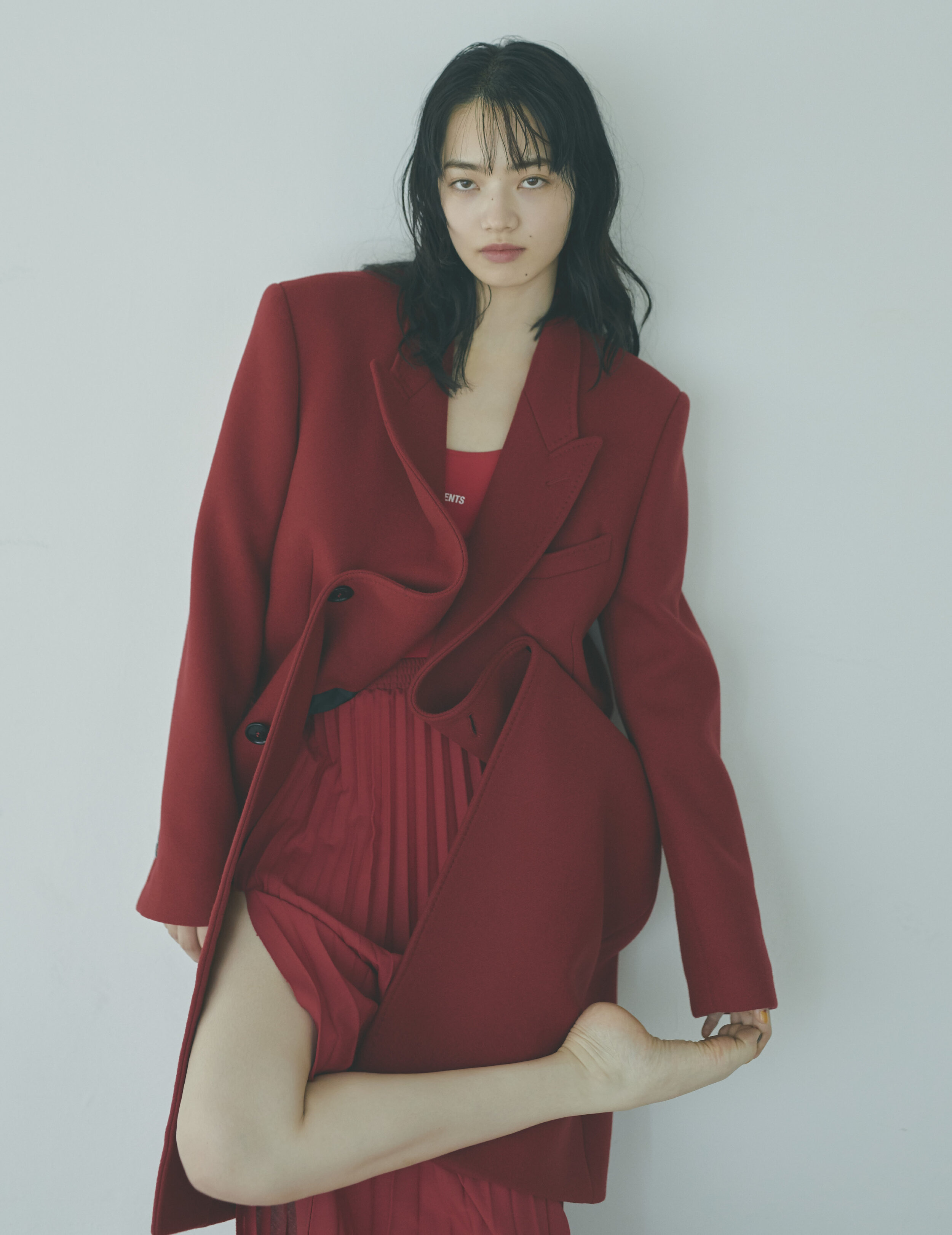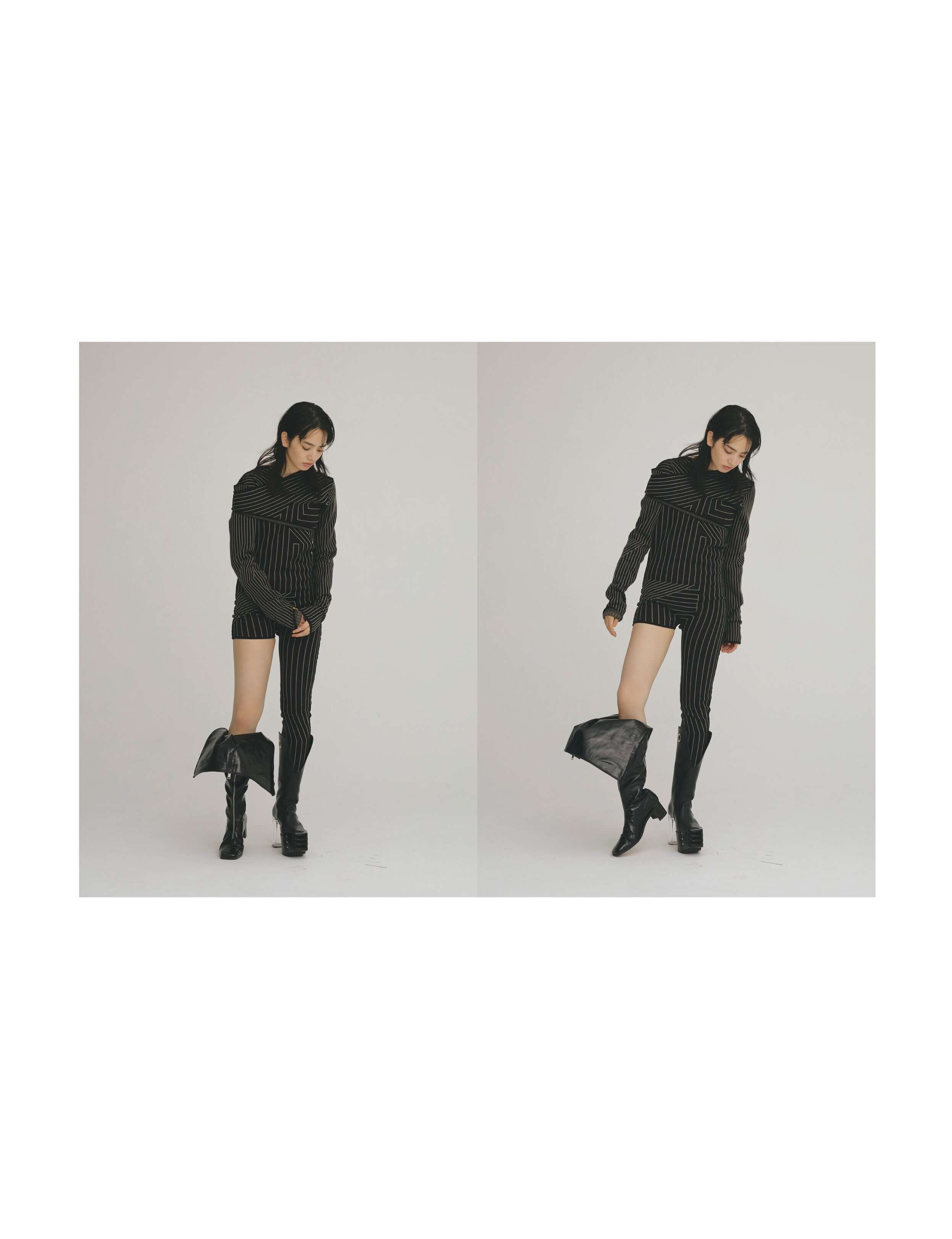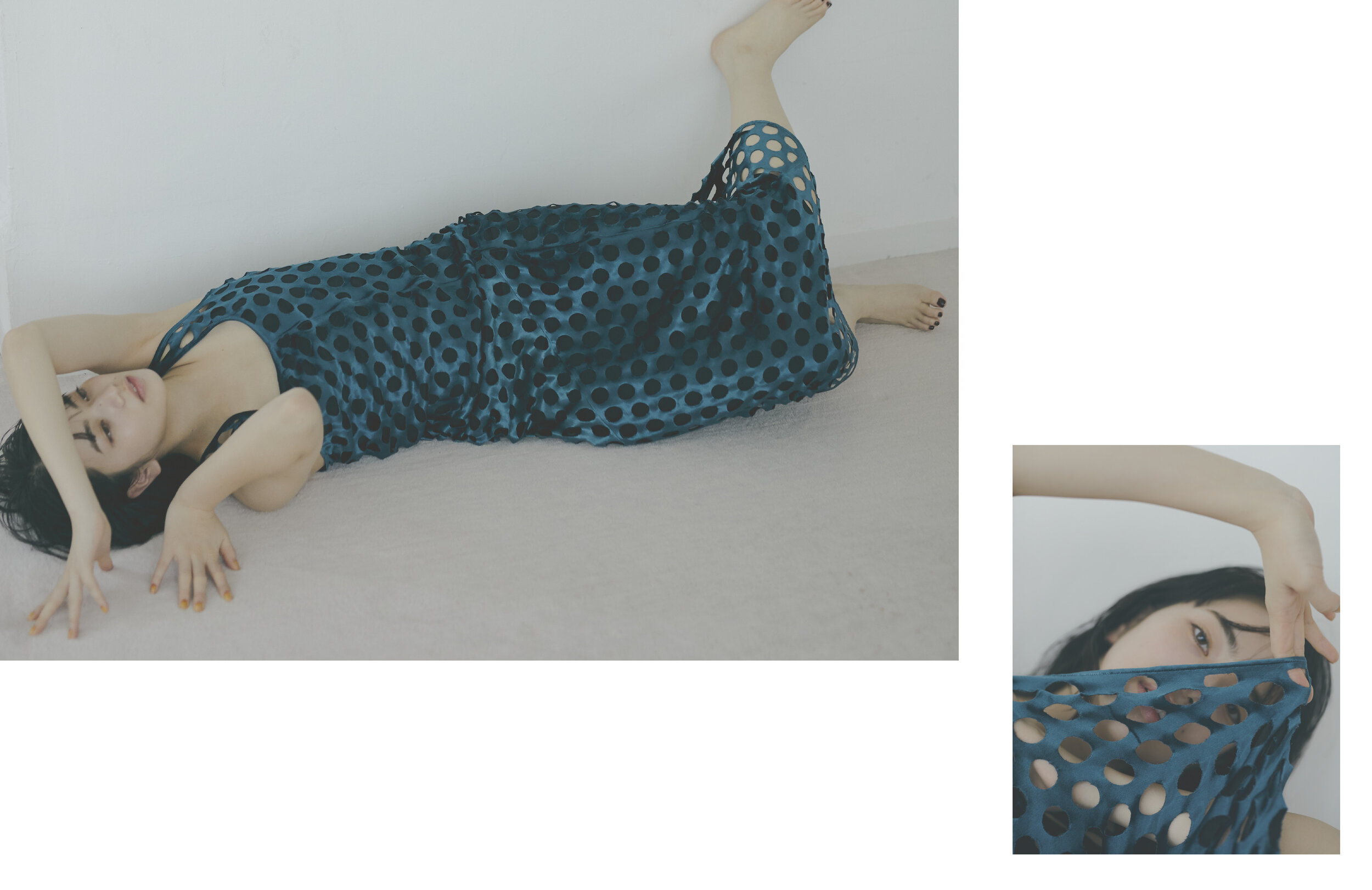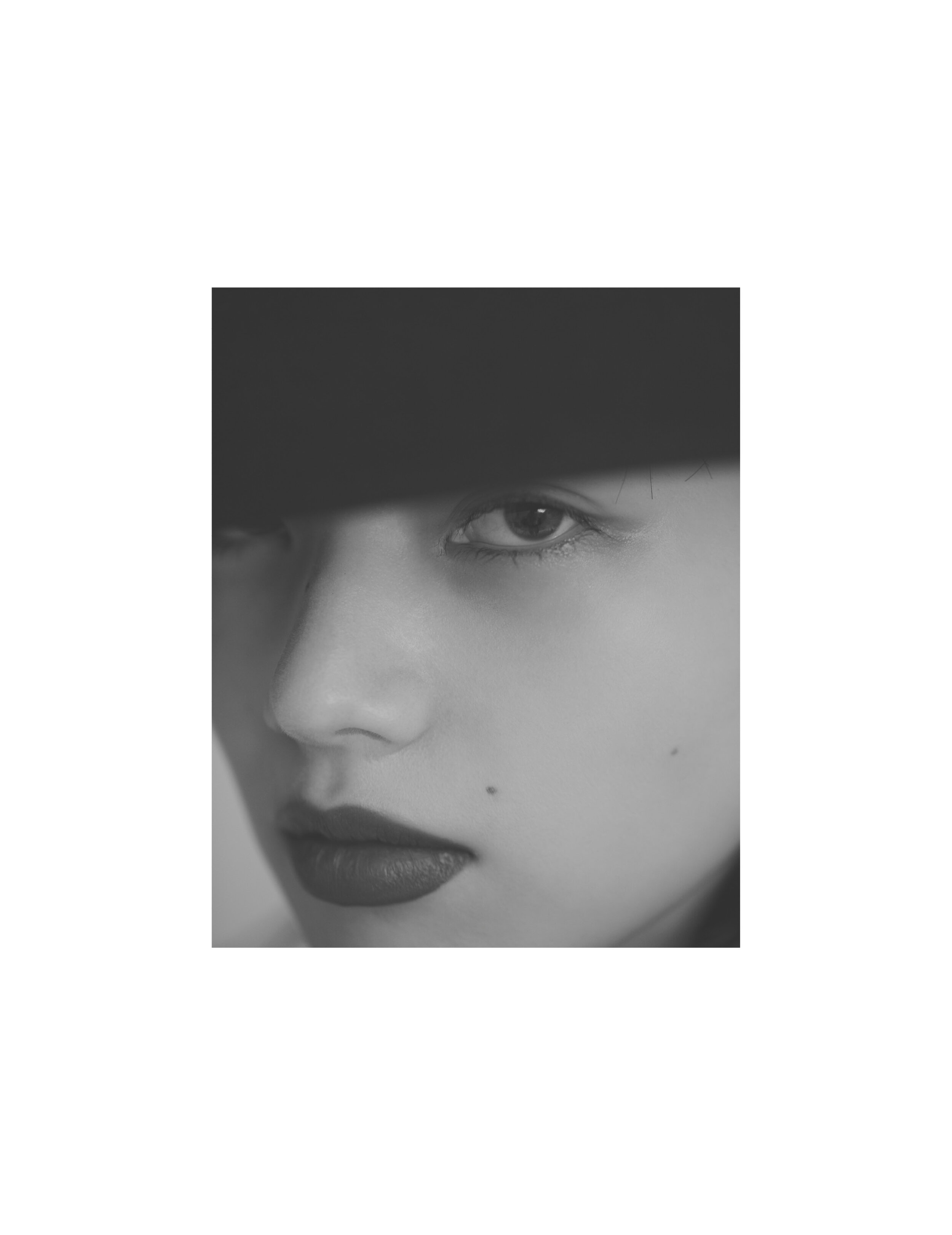Nana Komatsu
cover story in her. magazine volume 11
Coat, Skirt & Swimsuit_ VETEMENTS
Bodysuit & Right Shoe_ Rick Owens, Left Shoe_ COURREGES
Jacket, Skirt & Shoes_ CHANEL
Dress_ YOHJI YAMAMOTO, Shoes_ Maison Margiela
Coat, Dress & T-Shirt _ JUNYA WATANABE COMME des GARCONS, Sheer Skirt_ Acne Studios, Shoes_ Vintage(HOOKED)
T-shirt_ Vintage(HOOKED)
Dress & Necklace_ Ann Demeulemeester
Dress_ Maison Margiela
Hat & Dress_ Nina Ricci, Shoes_ TOGA
Knit Vest_ TOGA, Swimsuit_ Stylist’s own
Photography _Yuki Kumaga
Styling_ Shotaro Yamaguchi
Hair_ Keiko Tada (mod’s hair)
Makeup_ UDA
Design_ Yukio Sagaya
@konichan7
a conversation with Nana Komatsu
Writers_James Oliver & Mari Kishi
Down-to-earth, polite, humble, positive, well-spoken; these are just some of the ways that you could describe Komatsu Nana. One of Japan’s biggest celebrities, her reputation is now growing overseas having appeared in Martin Scorsese’s blockbuster Silence. While only 24 years of age, her maturity shines through as we sat down to talk about everything, from how she got her breakthrough in acting, to her experience working with Scorsese and her love for vintage clothing. Nana will certainly go far in life, no matter what she decides to do.
ow did you become interested in pursuing a career in acting?
I first got into the world of entertainment when I was scouted in Harajuku as a 12-year-old. At that time, I had vague ideas about what I wanted to do, but I hadn't really thought about my future yet; actually, I was thinking about becoming a hairdresser. Initially, I started out as a model, but I had my acting breakthrough when I was 17 when I got a role in the film Kawaki (Thirsty) directed by Tetsuya Nakajima.
Did you audition for this role?
My manager brought me the script and suggested that I audition. I had nothing to lose so decided to audition for the part. At the time, I wasn’t exactly sure that I wanted to pursue acting but I thought it would be a good opportunity. I was nervous throughout the audition, so I have no idea how I got the role, but the director offered it to me, so I gave it my all. It was my first time acting and I had to kiss six different people which was daunting at first. I expected to be more worried about it, but I was able to tell myself that it was just a role and it was my job so I was able to keep it all in perspective.
You weren’t interested in acting up until then?
I had never acted before because I had been working as a model; acting had never really crossed my mind. I felt embarrassed acting in front of the camera and in front of so many people and I wondered if I would be able to remember my lines.
Did acting turn out to be completely different from modelling?
Completely different, but I had my modelling career as a base to work off so I felt that I could move freely… I think I knew how to present myself. I used to do jazz dancing so that might have had some influence, too. The way I angled my body when modelling was also based off my dancing experience. If I would start to think too much, I would freeze up, so moving my body without thinking too much works better for me. Whether it is acting or modelling, the costume determines the mindset I’ll have going into filming or shooting. If I hadn’t done modelling, I probably would have gone into acting without any clue of what I was doing. There are still a lot of things I don’t know or understand about modelling and acting, but I decided early on that I would go through with it, even if I made mistakes or embarrassed myself.
How has your vision towards the acting profession changed and evolved since you started working in the industry?
It has made me realise that it is a job with a lot of responsibilities; the responsibility of leading the film or even a scene. Those responsibilities have grown in comparison to when I had just started acting. The more I learn about the process, the more things I have to think about. There are so many other people involved in making a film, it’s not just me, so I can’t let everyone else down.
Having started out as a model, then beginning acting at 17, it seems that your experiences in the movie Kawaki made you think that acting is fun.
I really liked to be on set. The atmosphere that comes with being on the set of a movie is very passionate and warming. We were filming for two months so I built a very close relationship with the crew. To be honest, I didn’t know what to expect and I still hadn’t figured out the details of my role, but the most important thing I had kept in mind was how to express the different emotions – joy, anger, sadness and pleasure. Things like how I should shed my tears when crying, or where to focus my feelings when expressing anger.
The way the world sees me and the way I think of myself are different, so I was confused at times. But as I’ve gotten more roles in different productions and played different roles and characters, I’ve learnt to control the way I express my emotions and the perspective I have for my roles. I started aiming for something much bigger, and that has made acting more enjoyable and enriching.
When acting, you probably start to develop your own ideas on how you want to portray the role; do you ever express that to your director?
At first, I felt I couldn’t at all. Earlier on, I would just simply act the role that was given to me, but then I realised there would be no significance in the fact that I was the one playing the role, and I also didn’t want people to think that I didn’t have my own will. If it was a role of a samurai, I would try to learn the etiquette of sword shielding and practice until I made it my own. I think about what the role needs because no one is there to tell me unless I do it myself. Most of the actors that I’ve worked with so far are hard workers so that has definitely had an influence on me, too.
Silence was your first foreign movie; what was it like working with Martin Scorsese?
I also got the role in Silence through an audition where I had to act all alone in front of the camera. In Japan, auditions are usually done in partners or in groups, so it was a new experience and I was very confused by how it’s done abroad. You must express your emotions and expressions into a single camera. It was a great experience overall; very empowering. Even if you are given a certain task, you have to show more than what is expected.
After I got the role, it was the language that was my greatest challenge. There were lines that I had to learn in English so I had to improve my pronunciation. Our crew members were from different countries like the United States, Taiwan, and Japan but the common language was English so I had to do my best to understand, otherwise I wouldn’t have been able to communicate and I would have most certainly been left behind. In Japan, once you’re on set, people explain all the details and flow to you prior to filming; however, in the case of Silence, I had to understand everything by myself, so I tried to think ahead and move accordingly. This is also true in general when applying yourself to acting. I have to be able show that I can do more.
So far, Silence is my only experience of acting in a foreign movie but it has really made me stronger, both mentally and physically. For Silence, there were Japanese crew members as well so I had instances where I could rely on them too, which was an advantage. I would really like to do more acting overseas in the future; I'd like to be able to test myself and discover what I can do.
You've been in a wide variety of films and played a wide range of roles and characters; how do you mentally prepare before you start a new role?
I know it’s a small thing but I usually cut my hair once we have finished filming, even if it’s only a few centimetres. When I cut my hair, I feel like the role I played is going to leave my body. I want to make a change that is visible once I’m done with filming. I also like to travel so I usually take some time off and go on holiday, no matter how short or long. I use it to switch back to reality from the time I spent in a certain role while filming because I like to immerse myself in that character.
I actually wanted to ask you about travel; are there any particular places you like to go?
I like to travel overseas and I really like London, Canada, and Australia. It always tends to be very impromptu; I just decide to head somewhere for about week without making any hotel reservations. If I don’t know what to do or if I don’t understand something, I tend to ask the local people for ideas or I can always look it up on my phone. I’m attracted to the idea of visiting a country where there won’t be many tourists; to go somewhere that is completely different and unexpected. I was hoping to go somewhere recently but obviously, due to COVID-19, this isn’t possible.
In the past, I have been fortunate enough to also travel a lot for work. Turkey was amazing because they have so many different cultures mixed together, which is fascinating. There’s a sense of an Asian atmosphere combined with western culture; this is something that I fell in love with. I want to visit as many countries as possible while I’m still young and I would also like to try living somewhere else for two or three years, maybe longer, then settle down in Japan to enjoy the serenity when I’m older.
What do you enjoy doing in your free time?
I love vintage clothing so I really enjoy exploring vintage stores, usually around the Kanto area. Even when I am travelling overseas, I love to go shopping in vintage stores, just like when I’m home in Japan. I own so much vintage clothing, it’s ridiculous, and the majority of my wardrobe is vintage. I’ve always been into second-hand clothes and vintage items and they always make me want to collect more.
What kind of sub-cultures are you into?
I listen to all kinds of music, regardless of the genre. When I was a kid, my mother would take me to small local live houses near where I grew up. The loudness and mayhem were so much that it was actually soothing and I would fall asleep. I was little but I still remember it as a fun memory. My mum’s friends would also bring their kids so I would play with them at the live houses. They were places where I could not only listen to music but also meet new friends and play.
Away from acting, is there anything new you would like to do in the future?
Well… I like vintage clothing so it would be interesting to do something with that but I don’t want to start a store just yet. In my home, I have a room just for clothes and that goes to say how much I own. It’s really hard to keep them stored, but it makes me happy that I’m surrounded by the things I love. The idea of being a vintage clothing buyer interests me and I could also travel overseas to buy items. Just the idea of it and talking about it now is making me excited.














